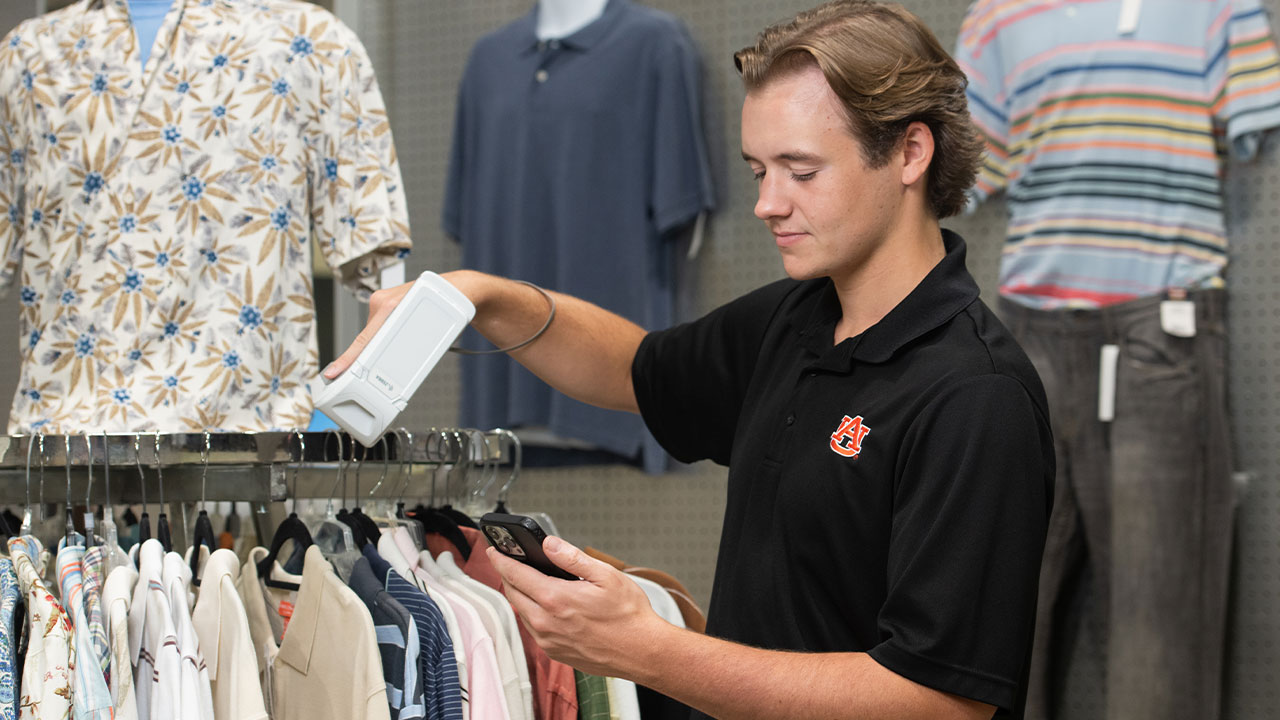content body

The mock retail store inside the RFID Lab allows students and researchers to test inventory tracking processes with RFID technology.
“We’re doing innovation,” said Justin Patton, executive director of Auburn’s world-renowned RFID Lab. Then he stops himself. “A better word, really, is transformation.”
He makes a good point: RFID (Radio Frequency Identification) has existed for decades. Allied forces used the technology in WWII to identify whether incoming airplanes were friends or foes. But the lab’s student workers, alongside its faculty and staff, are transforming and improving the ways in which tracking technology is used in industries like retail and aviation.
You likely interact with RFID all the time, whether you know it or not. If you’ve been to the grocery store, tracked your pet, used an E-Z pass on a toll road or competed in a race, you’ve encountered the technology.
RFID uses radio frequency waves to wirelessly transfer data and identify and track “tags” attached to objects.
It’s made major waves in the retail industry by streamlining inventory tracking, preventing theft and providing insight into potential trends. A store associate armed with a “reader” can track hundreds of tagged products in seconds from yards away, as well as provide data on which products are most often shoplifted.
But RFID’s influence goes way beyond retail. Farmers use RFID-equipped ear tags to keep an eye on their cattle. Airlines use it for everything from refreshment-cart maintenance to baggage tracking. Medical professionals use it to manage medication inventories.

Working with Delta, Auburn student researchers have refined tag capabilities that allow flight attendants to track a plane’s food and beverage inventory and airline workers to track checked luggage.
Working with the Fortune 500
The RFID Lab conducts research in four major industries with four major partners: Delta, UPS, McDonald’s and Walmart.
Delta’s $6.2 million gift to Auburn in 2017 not only funded the university’s aviation building, it also provided research funding for the RFID Lab. Since then, student researchers have polished and refined tag capabilities that allow flight attendants to track a plane’s food and beverage inventory, and airline workers to track checked luggage.
And then there’s UPS. “Everyone wants to know where their packages are,” according to Patton. “This makes that information faster and more accurate.”
The lab’s partnership with McDonald’s helps the restaurant chain improve their operational flow while enhancing ingredient traceability and visibility. The Food Safety Modernization Act requires U.S. food manufacturers to digitally track their products for recalls and food safety, and RFID is a significant enabler.
The food space is new ground for the RFID team, but Patton is excited about the potential for more supply chain transformation, not to mention the sustainability benefits the research will bring.
RFID tags make ingredients traceable, eliminating the need to oversaturate the supply chain with food products that will either rot on store shelves or get thrown away at home.
In April, the lab announced a major partnership with Los Alamos National Laboratory in New Mexico to promote RFID and to enhance collaboration in research, education and workforce development.
Meanwhile, Switzerland-based semiconductor manufacturer EM Microelectronic joined the lab’s advisory board. This relationship will open up new research opportunities, particularly in the Bluetooth space.
A New Kind of Educational Experience
Patton, who was a student himself when the lab started at Arkansas in 2005, expects a lot from the students who work in the lab, and they’re often rewarded in the end. Graduating students are frequently hired by the lab’s corporate partners.
“Education’s changing, and college won’t be the same as it has been,” he said. “I think it’s going to become more like what happens here, where we’re doing experiential learning, working with outside companies and helping with the hiring cycle.”
As the 20th century advanced, so did RFID. By 1973, the technology was officially patented by an entrepreneur who used the tags to unlock doors without keys. The rest, as they say, is history. Or at Auburn, the future.
Want to know more?
Find the entire story on Auburn's RFID Lab in the latest edition of Auburn Magazine.
Track 'em



